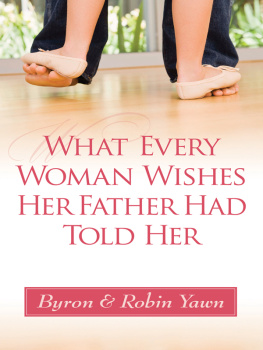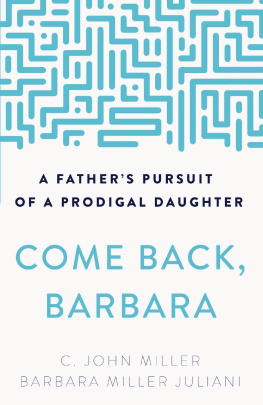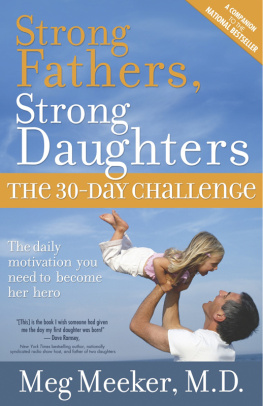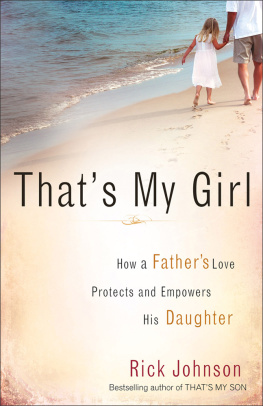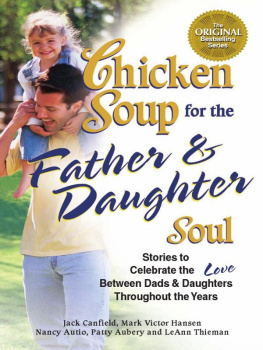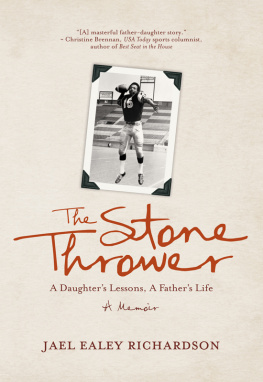

To my husband, the father of my daughter, who has helped her become the young woman she is.
Contents
[ INTRODUCTION ]
Why I Wrote This Book
C ONVENTIONAL wisdom has it that you should write about what you know. Being a somewhat unconventional person, however, I find myself writing about something I have not personally known but passionately want to understand. Just as a teenager playing Juliet imagines a world where being sealed alive inside a tomb is preferable to marrying the aristocrat next door, or an archaeologist cradles a cracked clay pot and wonders about the ancient hands that shaped it, so I try to conjure that foreign land where girls grow up with two parents, not one, and one of them is forever and always, for better or for worse, her dad.
In the realm of fathers and daughters, I am an outsider. I hold no citizenship there, nor can I converse with its inhabitants in a common language. I have traveled there only on the visas of social science, parenthood, and curiosity. When I am there, I listen closely to what its inhabitants are saying; when I speak, it is usually to ask questions.
My father died of a heart attack when I was three-and-a-half years old, leaving three daughters under the age of ten, my mother a widow at thirty-three, and me a lifetime of wondering what I missed. When I became old enough to miss him, I imagined him living in the massive old elm tree outside my bedroom window, hidden in its lush leaves and watching over me as I slept. Looking back, I realize how young my mother was when he died, and how it must have seemed logicalnecessary, evenfor her to find someone to fill the void in her heart and our family. She did marry again some years later; I was about ten, my sisters were thirteen and fifteen. I remember the man she married as being tall and very handsome (my mother was unusually attractive as well, and I have a childs impression of them looking beautiful together, especially when they dressed to go out for the evening). He was a quiet, gentle person, and from what I recall, a perfectly decent fellow. Still, I have no vivid memories of doing things with him or being close to him; I cannot recall the color of his eyes, the sound of his voice, or the smell of his aftershave.
If my relationship with my stepfather was short on bliss, it was also short on drama, which I attribute to the benign detachment with which he regarded my sisters and me. Its not that he was never around; like many of my friends dads, he came home after work, ate dinner with us, and was available to take us places when we were still too young to navigate the Philadelphia suburbs on our own. He did many things that real fathers do: He mowed the lawn, took out the garbage, and did the driving if we were all going someplace together. But when it came to the intensity with which my friends dads occasionally eruptedusually in response to learning that his daughter was running around with a guy on a motorcycle who had a pack of Lucky Strikes tucked up his T-shirt sleevethat was not a feature of my teenage years (full disclosure: I had no objections at the time). Although my mother and my stepfather must have had their share of disagreements, I have no memory of him speaking harshly to her, and, looking back from the vantage point of my own long-haul marriage, it seems to me that they conducted their rather shorter one with intimacy and restraint. But when it came to my sisters and me, my stepfathers behavior was governed by a policy of amiable disengagement. He was never nasty, cold, or mean to us. But I dont remember any ecstatic moments of joy, comfort, or contentment in his company, either.
I was fifteen when the marriage ended. Because the relationship was not a tempestuous one, Im fairly certain the split had less to do with incompatibility than with finances. The bottom line is that when I was in sixth grade, my mothers new husband came to live with us and then, five years later, he moved out. When he left, I must have missed his presence at the dinner table or (true to teenage form) in the drivers seat when I needed to go someplace, but I didnt feel as if an essential part of my life had gone missing. I harbored no feelings that my dad had abandoned the family and left me desolate. The reality was, I had lost my father long ago.
Now, a lifetime later, the girl I was then is still firmly ensconced in the woman I have become. Married to the same man for more than thirty years, I am mother to a grown son long out of the house and a daughter who is about to begin her first year at college. I am immersed in work I love, work that retains its charge and keeps my imagination humming. As a medical school faculty member, I interact with some of the freshest, nimblest minds in the nation; as a research psychologist, I am a trusted listener, privy to the innermost thoughts and ruminations of people in search of themselves and their roles in the world. While working on this book, I was privileged to listen as scores of women contemplated aloudforcefully, wistfully, and sometimes tearfullytheir connections with their fathers. Through it all, I listened for chords that either resonated with or differed from our societys and cultures received wisdom about what fathers and daughters should and actually do mean to each other.
I had some ideas about what to expect.
In my first book, Raising Boys Without Men, I tackled the question of what it takes for a boy in our culture to develop into a man. The book grew out of a ten-year research project started in 1996 in which I compared boys growing up in two-parent lesbian families to boys growing up in heterosexual mother-father families. For the book, I expanded my focus and included other types of woman-headed households challenging the traditional view that a woman needs a man around the house and in her bed for her son to develop into a healthy, virile, heterosexual man. I spent years interviewing, spending time with, and getting to know two groups of boys and their parents. One group of boys came from traditional one-man, one-woman families; the other group came from families headed by women, whether they were single mothers by choice, mothers rendered single by divorce or the death of a partner, or two-parent lesbian families. What I found was that boyishness and masculinity seemed as firmly hardwired in the sons of woman-headed families as they were in the sons of woman-and-man-headed families. Nothing I found indicated that women rearing boys without fathers were placing their sons at a disadvantage, or that these boys transitions from boyhood to manhood would be any more or less fraught with gender conflict, doubt, and struggle than those of the boys living in more traditional homes. I found this profoundly encouraging, as did a host of experts in the fields of gender development and social science. (Some social conservatives saw fit to demur with varying degrees of vigor and civility, but thats another story.) I concluded that the capacity to love, nurture, and coach Little League baseball are human characteristics, unique to neither males nor females and shared by both.
Raising Boys was a satisfying fusion of professional and personal passion. I had long been fascinated by the dynamics of sexual orientation and gender identity and by observing the forces that influence boys and girls to grow into the kinds of men and women they become. As the mother of a son and a daughter, I had witnessed up close the different ways they responded to me, my husband, and their friends, and had observed the evolution of their personalities, senses of humor, and concepts of self. Moreover, I had had an opportunity to observe and contemplate the relative limits of nature and nurture (as can any parent of more than one child): Here were a boy and a girl reared in the same household by the same parents, yet exhibiting different interests, talents, and tastes. They were similar in some ways, different in others. And while some of their characteristics were clearly dictated by genes, others were less traceable. As I watched my daughter grow, I wondered, where did she get her confidence, her independence, her drive? Was she born that way or did she learn it? And if she did learn it, whom did she learn it fromme, my husband, or both of us?
Next page

